UN’s High Seas Treaty contains significant ramifications for the global merchant fleet

Global merchant shipping could be in for a shake-up following the signing of the High Seas Treaty at the United Nations headquarters in New York over the weekend.
The historic agreement signed by nearly 200 nations aims to protect the world’s oceans following 10 years of negotiations.
The High Seas Treaty aims to place 30% of the seas into protected areas by 2030, up from the current 1.2%.
The new protected areas will put limits on deepsea mining, fishing, and potentially change the routes of shipping lanes, with some activists now urging regulators to look at banning open-loop scrubbers in these areas.
Ships polluting far out to sea will also face greater scrutiny once the treaty becomes law.
“What happens on the high seas will no longer be out of sight, out of mind,” said Jessica Battle of WWF in a statement after leading the group’s team at the negotiations. “We can now look at the cumulative impacts on our ocean in a way that reflects the interconnected blue economy and the ecosystems that support it.”
The treaty will enter into force once 60 countries have ratified it.
The High Seas Treaty is likely to see debate over the merits of open-loop scrubbers reignite. Introduced in the run-up to the 2020 global sulphur cap, scrubbers have had a positive impact on airborne emissions, but their effect on the sea has caused controversy.
Research published last October from Chalmers University of Technology in Sweden suggested the discharge water from ships’ exhaust gas treatment systems is responsible for up to 9% of certain emissions of carcinogenic and environmentally harmful substances in the Baltic Sea, which is considerably more than was previously known.
Furthermore, the number of ships equipped with scrubbers have more than tripled since the study was carried out.
The researchers’ study is unique in its kind and was commissioned by the Swedish Transport Agency and the Swedish Agency for Marine and Water Management to investigate the environmental impact from scrubbers in the Baltic Sea, compared to other sources of environmental contaminants.
In the Chalmers study, published in the Marine Pollution Bulletin, the researchers found that more than 200m cu m of environmentally hazardous scrubber water were discharged from ships that used exhaust gas cleaning systems in the Baltic Sea – in just one year. The study showed that scrubber washwater accounts for up to 9% of the emissions of certain cancer-causing polycyclic aromatic hydrocarbons (PAHs) into the Baltic Sea. The study also revealed that ships painted with copper-based antifouling paints account for a third of the total supply of copper to the Baltic Sea. Copper in antifouling paints is already a known environmental problem as the metal cannot be degraded in the environment and therefore leads to high levels in water, sediment, and soil. But exactly how much of the load of copper and ship traffic accounts for, has previously been unknown. Also, the cancer-causing PAHs are difficult to degrade and can spread widely in the environment before breaking down.
The research results have led the Swedish Transport Agency and the Swedish Agency for Marine and Water Management to propose a ban on the discharge of scrubber water into the internal waters of the Baltic Sea.
Scrubber discharge bans have been rolled out in many corners of the globe with politicians increasingly concerned about their harmful impact.


Let us once and for all stop these open loop scrubbers!!! It has been wrong from day one!!
Thank you for this very informative report.
I’ve seen this announcement over the weekend, on four different online platforms.
Yet none of them have provided any details on what exactly did everyone actually agree to. A lot of patting on the back, though I suspect the devil is in the details. That my friend, is where everything usually goes awry. We shall see.
Thank you for a really informative article. Open loop scrubbers should be banned once and for all as the amount of pollutants that are not going up in the sky are now being discharged in the high seas. Shipowners greed and lack of commitment to reduce their polluting practices , ie the one that have gone for scrubbers, should be told to spent their ill gained profits on dismantling open loop scrubbers . The whole practice is a disgrace and shows the weakness of the IMO in allowing shipowners to use this subterfuge and pretend to care for the environment whilst shamefully make money on the back of it … I feel like puking !!